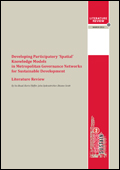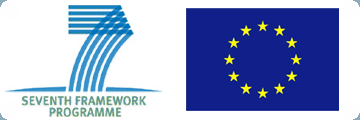 By Isa Baud, Karin Pfeffer, John Sydenstricker-Neto, Dianne Scott
Literature Review No 1 – March 2011
In this literature review it is examined how governments and citizens in cities with differing patterns of economic growth make use of participatory spatialised knowledge to direct urban governance towards more sustainable development (SD). Participatory spatialised knowledge is the main concept used to study the issue of how urban development processes can be made more sustainable, resilient and inclusive, as participatory spatialised knowledge reflects a strategic resource, to which all stakeholders in urban governance processes can contribute. The question is whether demands for, and contributions to, such knowledge can become more embedded and participatory in urban decision-making processes, and what the implications are for more sustainable/resilient urban development outcomes.
This question fits into a broader debate on how urban policy-making processes are changing from processes in which governments are the dominant locus of power to those in which networks of different actors participate in governance networks, i.e. the shift to a network society (Barnett and Scott, 2007a, Baud and De Wit, 2008, Castells, 2000, Coaffee and Healey, 2003, Hajer and Wagenaar, 2003, Innes and Booher, 2003). It also fits into the broader debate on how new forms of locally constructed knowledge can provide strategic inputs into the socio-political processes embedded in urban governance networks. Therefore, we will deal with the questions posed in our main questions against the background of these two broad debates, drawing on them as they contribute to answering our main research question.
The main issues in this chapter concern how different types of knowledge are constructed, how they are negotiated to settle controversies and make decisions within governance processes, and the implications of such outcomes for the growth patterns, inclusiveness (and inequalities) and environmental sustainability and resilience of urban development.
The paper first discusses the contemporary context of the network society and the shift to participatory governance in Section 2. Section 3 reviews literature related to knowledge construction and recognition in urban development processes; while section 4 provides a critical discussion of the concept of participatory spatialised knowledge as the primary concept framing the Chance to Sustain research project and the focus of WP5.
|
Recent Chance2Sustain Publications |
|
|
|
|
|
